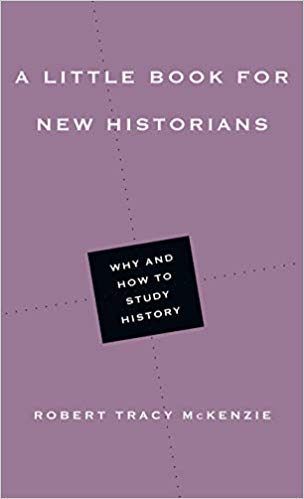A Book Review from Books At a Glance
Ryan McGraw
History is an endangered discipline in the United States. History is underplayed and downplayed, if not wholly excised in contemporary American education. Yet history is part of what constitutes who we are now. Those who believe in the historical Christ, by the Spirit speaking through an infallible Bible, literally stake their lives on history. Christ has governed and preserved his church throughout history and he has promised to do so until the end of history as we know it. Robert McKenzie introduces his readers, Christian or otherwise, to proper ways of doing history. While his work is not unusual, profound, or groundbreaking, it is clear, memorable, and timely for all readers.
This book primarily treats the aspect of historiography that we can call historical thinking. In other words, what mindset is needed for the pursuit of history? The author divides his material into why we should study history and how we should do so. The appendix usefully summarizes the content of the entire book, promoting memory through condensed review. The thrust of the book is to show that history is not about producing or memorizing lists of names and dates, but of evaluating cause and effect relationships between events and ideas. This means that history involves analysis more than memory (68). While I disagree with the author that historians can study the motives of historical figures (75), I cannot overstress the need to look for underlying causes of events and ideas and to understand them in historical rather than in contemporary terms. Motives are lost unless authors tell us what their motives were. Yet people should learn to “study the past on its own terms” even if we do not study the past “for its own sake” (85).
One of the outstanding features of this book that rings increasingly true with this reviewer is that proper historical method promotes empathy with others (36). We are so ready to treat our heroes and friends as though they can do no wrong that we are often equally ready to treat those who do not fully fit our mold as though they can do no right. It is vital for Christians to understand others on their own terms and from their own perspectives. This is a vital skill in studying and writing history. It is also a vital skill in living peaceably with all, as much as we are able to do so. Learning to ask historical questions of historical people rather than our own questions helps us understand ourselves in relation to others rather than others in relation to ourselves. We can only evaluate contemporary and historical ideas when we have heard them adequately first. Many people today like to talk while few learn to ask others questions to understand who they are and how they think. Such self-focused habits are the best way to make visitors feel like outsiders in churches and to end rather than begin conversations in evangelism. In this respect, historiography can train us to be less self-centered in our approach to the world without abandoning the need to evaluate and discern ideas. In short, history promotes maturity in personal character and in conduct towards others. Children may divide people simply into heroes and villains, but mature believers begin to recognize that the remnants of sin affect believers and some outstanding common grace features characterize non-believers. History is ultimately complicated (30) because people are complicated. History can make us practice empathy in a pluralistic society without sacrificing truth.
There are two kinds of readers who should read this book: those who know that they need it and those that don’t. Yet we all need it on some level. The erosion of historical consciousness and the decaying influence of Christianity are connected, at least in this country. This book reminds us that history is worthwhile and that we can learn as much from good historical methodology as well as from history itself. As a historian, theologian, and historical theologian, I wish that all believers better understood historical method. This would help us better understand the Bible in its historical contexts so that we might seek to listen to God’s voice in contemporary ones. As a minister, I am increasingly convinced that more is at stake in the study of history than history’s survival as a discipline. The methods undergirding history are intertwined with vital interpersonal and analytical skills that are evaporating in our society. Historiography can be good for our sanctification as well as for our research. While McKenzie does not provide readers with a philosophical (or theological) defense of history against its modern critics, he sets young historians on the right path in practice. He also teaches us why we should all be historians to a greater or lesser degree.
Ryan M. McGraw, Greenville Presbyterian Theological Seminary
